Digital Technologies for Crisis Management in Hospitality: Park Plaza
VerifiedAdded on 2023/06/12
|12
|2885
|373
AI Summary
This research proposal aims to investigate the application of digital technologies in crisis management within the UK hospitality industry, using Park Plaza as a case study. It seeks to examine the basic digital technologies used, analyze the issues faced by Park Plaza due to the COVID-19 pandemic, and explore the importance of these technologies in managing the crisis. The proposal includes a preliminary literature review covering digital technologies in hospitality, the impact of COVID-19 on the industry, and the role of technology in crisis management. The research methodology will employ a deductive approach, positivism philosophy, survey strategy, and quantitative research choice, utilizing probabilistic sampling to gather data from Park Plaza employees. The research will also address ethical considerations and provide a timeline for activities.

RESEARCH PROPOSAL FORM
STUDENT DETAILS
STUDENT DETAILS
Paraphrase This Document
Need a fresh take? Get an instant paraphrase of this document with our AI Paraphraser
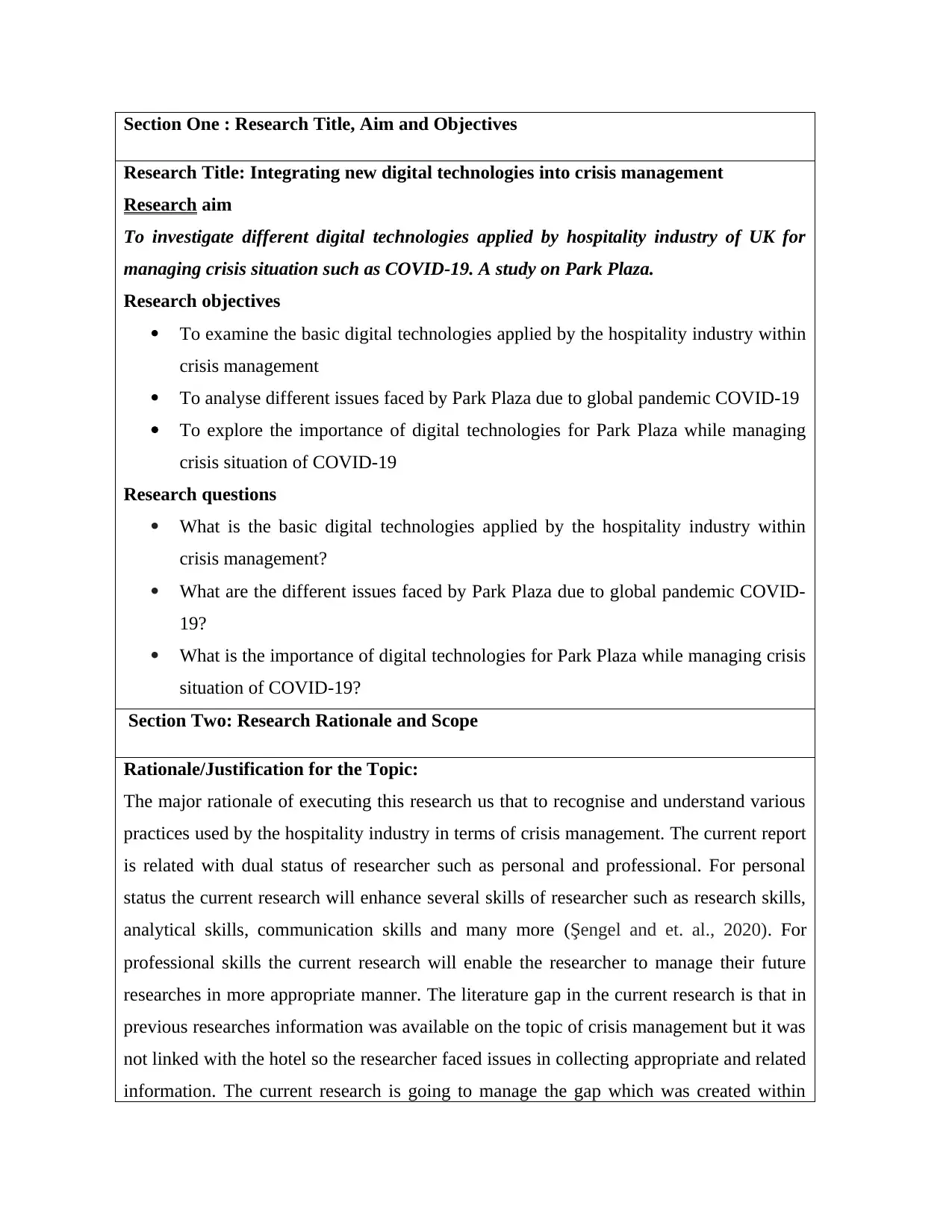
Section One : Research Title, Aim and Objectives
Research Title: Integrating new digital technologies into crisis management
Research aim
To investigate different digital technologies applied by hospitality industry of UK for
managing crisis situation such as COVID-19. A study on Park Plaza.
Research objectives
To examine the basic digital technologies applied by the hospitality industry within
crisis management
To analyse different issues faced by Park Plaza due to global pandemic COVID-19
To explore the importance of digital technologies for Park Plaza while managing
crisis situation of COVID-19
Research questions
What is the basic digital technologies applied by the hospitality industry within
crisis management?
What are the different issues faced by Park Plaza due to global pandemic COVID-
19?
What is the importance of digital technologies for Park Plaza while managing crisis
situation of COVID-19?
Section Two: Research Rationale and Scope
Rationale/Justification for the Topic:
The major rationale of executing this research us that to recognise and understand various
practices used by the hospitality industry in terms of crisis management. The current report
is related with dual status of researcher such as personal and professional. For personal
status the current research will enhance several skills of researcher such as research skills,
analytical skills, communication skills and many more (Şengel and et. al., 2020). For
professional skills the current research will enable the researcher to manage their future
researches in more appropriate manner. The literature gap in the current research is that in
previous researches information was available on the topic of crisis management but it was
not linked with the hotel so the researcher faced issues in collecting appropriate and related
information. The current research is going to manage the gap which was created within
Research Title: Integrating new digital technologies into crisis management
Research aim
To investigate different digital technologies applied by hospitality industry of UK for
managing crisis situation such as COVID-19. A study on Park Plaza.
Research objectives
To examine the basic digital technologies applied by the hospitality industry within
crisis management
To analyse different issues faced by Park Plaza due to global pandemic COVID-19
To explore the importance of digital technologies for Park Plaza while managing
crisis situation of COVID-19
Research questions
What is the basic digital technologies applied by the hospitality industry within
crisis management?
What are the different issues faced by Park Plaza due to global pandemic COVID-
19?
What is the importance of digital technologies for Park Plaza while managing crisis
situation of COVID-19?
Section Two: Research Rationale and Scope
Rationale/Justification for the Topic:
The major rationale of executing this research us that to recognise and understand various
practices used by the hospitality industry in terms of crisis management. The current report
is related with dual status of researcher such as personal and professional. For personal
status the current research will enhance several skills of researcher such as research skills,
analytical skills, communication skills and many more (Şengel and et. al., 2020). For
professional skills the current research will enable the researcher to manage their future
researches in more appropriate manner. The literature gap in the current research is that in
previous researches information was available on the topic of crisis management but it was
not linked with the hotel so the researcher faced issues in collecting appropriate and related
information. The current research is going to manage the gap which was created within
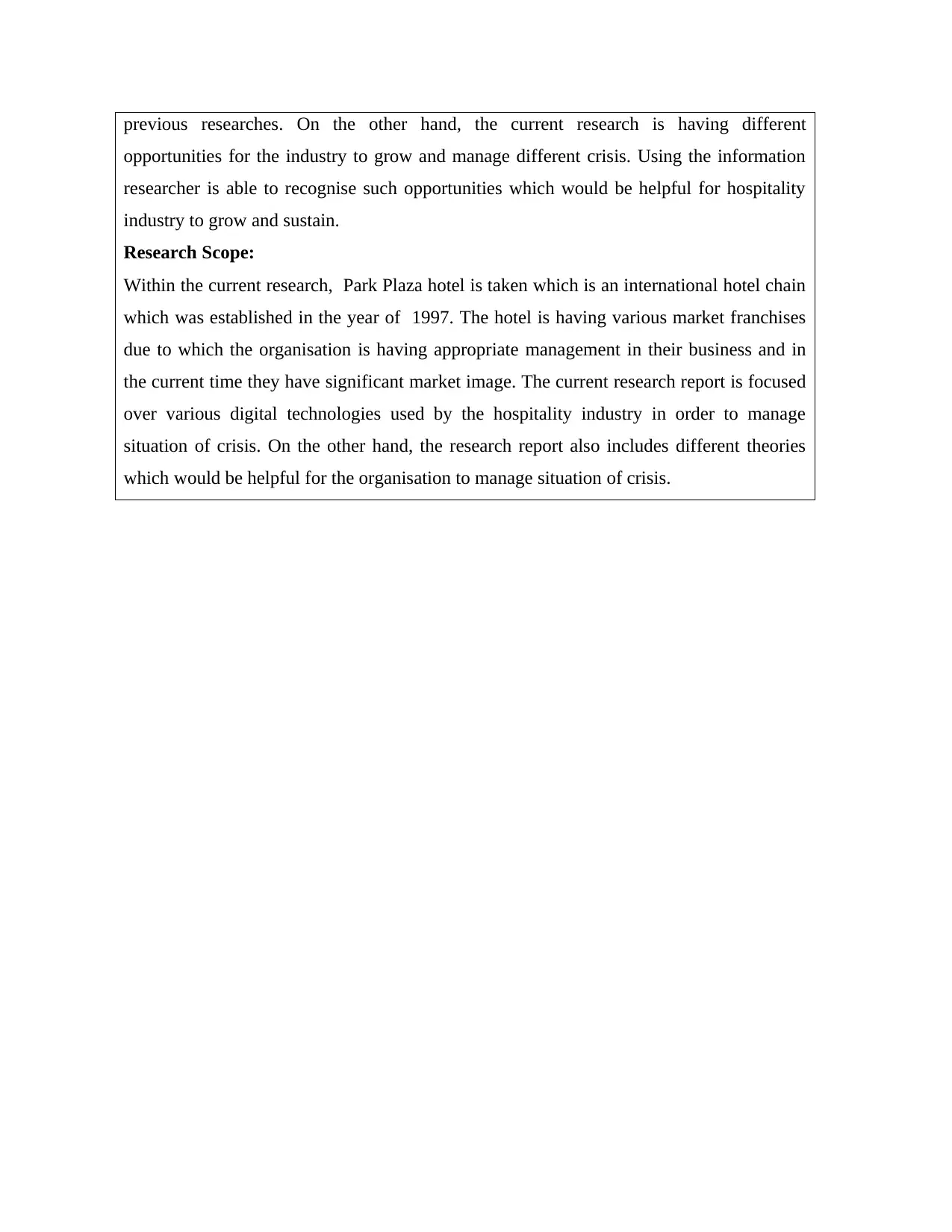
previous researches. On the other hand, the current research is having different
opportunities for the industry to grow and manage different crisis. Using the information
researcher is able to recognise such opportunities which would be helpful for hospitality
industry to grow and sustain.
Research Scope:
Within the current research, Park Plaza hotel is taken which is an international hotel chain
which was established in the year of 1997. The hotel is having various market franchises
due to which the organisation is having appropriate management in their business and in
the current time they have significant market image. The current research report is focused
over various digital technologies used by the hospitality industry in order to manage
situation of crisis. On the other hand, the research report also includes different theories
which would be helpful for the organisation to manage situation of crisis.
opportunities for the industry to grow and manage different crisis. Using the information
researcher is able to recognise such opportunities which would be helpful for hospitality
industry to grow and sustain.
Research Scope:
Within the current research, Park Plaza hotel is taken which is an international hotel chain
which was established in the year of 1997. The hotel is having various market franchises
due to which the organisation is having appropriate management in their business and in
the current time they have significant market image. The current research report is focused
over various digital technologies used by the hospitality industry in order to manage
situation of crisis. On the other hand, the research report also includes different theories
which would be helpful for the organisation to manage situation of crisis.
⊘ This is a preview!⊘
Do you want full access?
Subscribe today to unlock all pages.

Trusted by 1+ million students worldwide
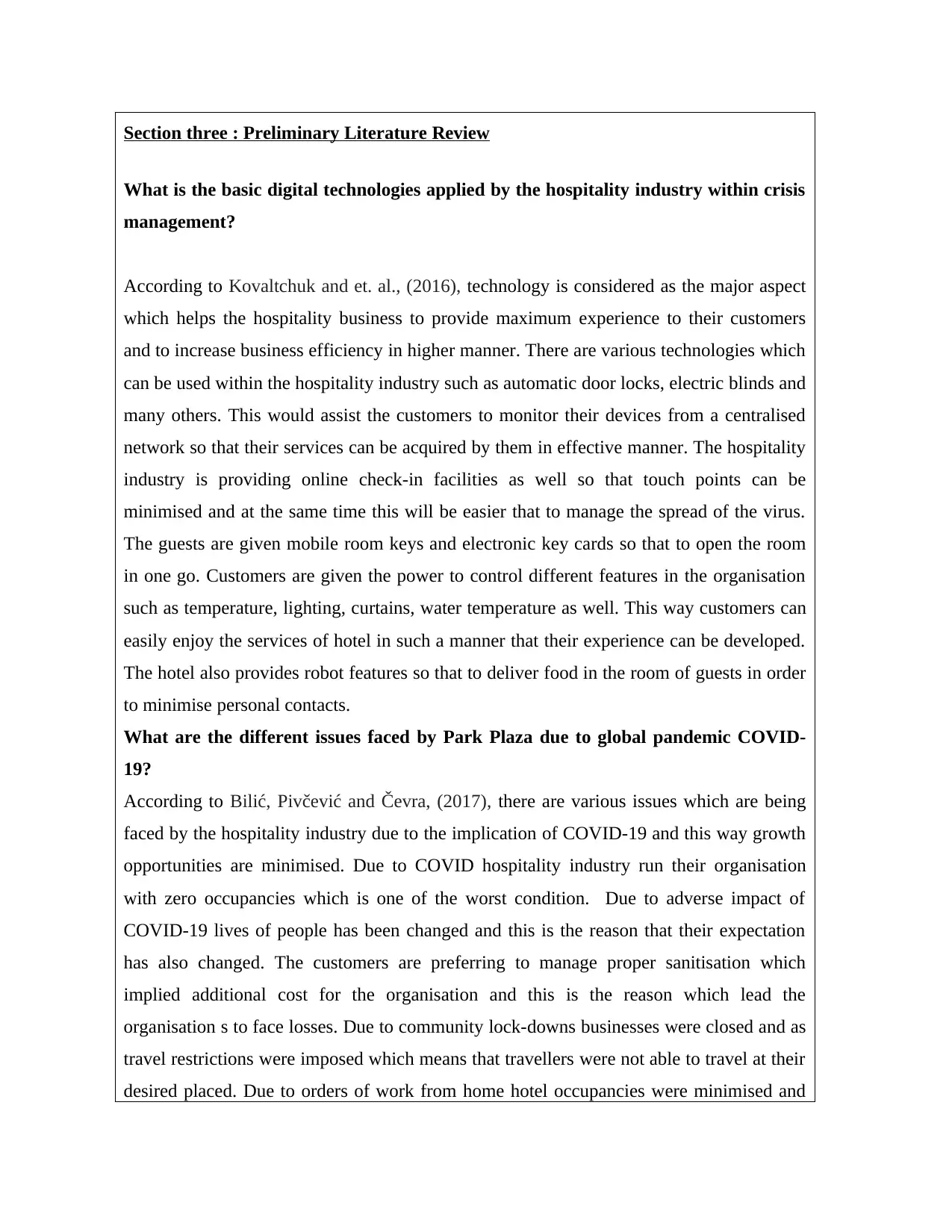
Section three : Preliminary Literature Review
What is the basic digital technologies applied by the hospitality industry within crisis
management?
According to Kovaltchuk and et. al., (2016), technology is considered as the major aspect
which helps the hospitality business to provide maximum experience to their customers
and to increase business efficiency in higher manner. There are various technologies which
can be used within the hospitality industry such as automatic door locks, electric blinds and
many others. This would assist the customers to monitor their devices from a centralised
network so that their services can be acquired by them in effective manner. The hospitality
industry is providing online check-in facilities as well so that touch points can be
minimised and at the same time this will be easier that to manage the spread of the virus.
The guests are given mobile room keys and electronic key cards so that to open the room
in one go. Customers are given the power to control different features in the organisation
such as temperature, lighting, curtains, water temperature as well. This way customers can
easily enjoy the services of hotel in such a manner that their experience can be developed.
The hotel also provides robot features so that to deliver food in the room of guests in order
to minimise personal contacts.
What are the different issues faced by Park Plaza due to global pandemic COVID-
19?
According to Bilić, Pivčević and Čevra, (2017), there are various issues which are being
faced by the hospitality industry due to the implication of COVID-19 and this way growth
opportunities are minimised. Due to COVID hospitality industry run their organisation
with zero occupancies which is one of the worst condition. Due to adverse impact of
COVID-19 lives of people has been changed and this is the reason that their expectation
has also changed. The customers are preferring to manage proper sanitisation which
implied additional cost for the organisation and this is the reason which lead the
organisation s to face losses. Due to community lock-downs businesses were closed and as
travel restrictions were imposed which means that travellers were not able to travel at their
desired placed. Due to orders of work from home hotel occupancies were minimised and
What is the basic digital technologies applied by the hospitality industry within crisis
management?
According to Kovaltchuk and et. al., (2016), technology is considered as the major aspect
which helps the hospitality business to provide maximum experience to their customers
and to increase business efficiency in higher manner. There are various technologies which
can be used within the hospitality industry such as automatic door locks, electric blinds and
many others. This would assist the customers to monitor their devices from a centralised
network so that their services can be acquired by them in effective manner. The hospitality
industry is providing online check-in facilities as well so that touch points can be
minimised and at the same time this will be easier that to manage the spread of the virus.
The guests are given mobile room keys and electronic key cards so that to open the room
in one go. Customers are given the power to control different features in the organisation
such as temperature, lighting, curtains, water temperature as well. This way customers can
easily enjoy the services of hotel in such a manner that their experience can be developed.
The hotel also provides robot features so that to deliver food in the room of guests in order
to minimise personal contacts.
What are the different issues faced by Park Plaza due to global pandemic COVID-
19?
According to Bilić, Pivčević and Čevra, (2017), there are various issues which are being
faced by the hospitality industry due to the implication of COVID-19 and this way growth
opportunities are minimised. Due to COVID hospitality industry run their organisation
with zero occupancies which is one of the worst condition. Due to adverse impact of
COVID-19 lives of people has been changed and this is the reason that their expectation
has also changed. The customers are preferring to manage proper sanitisation which
implied additional cost for the organisation and this is the reason which lead the
organisation s to face losses. Due to community lock-downs businesses were closed and as
travel restrictions were imposed which means that travellers were not able to travel at their
desired placed. Due to orders of work from home hotel occupancies were minimised and
Paraphrase This Document
Need a fresh take? Get an instant paraphrase of this document with our AI Paraphraser
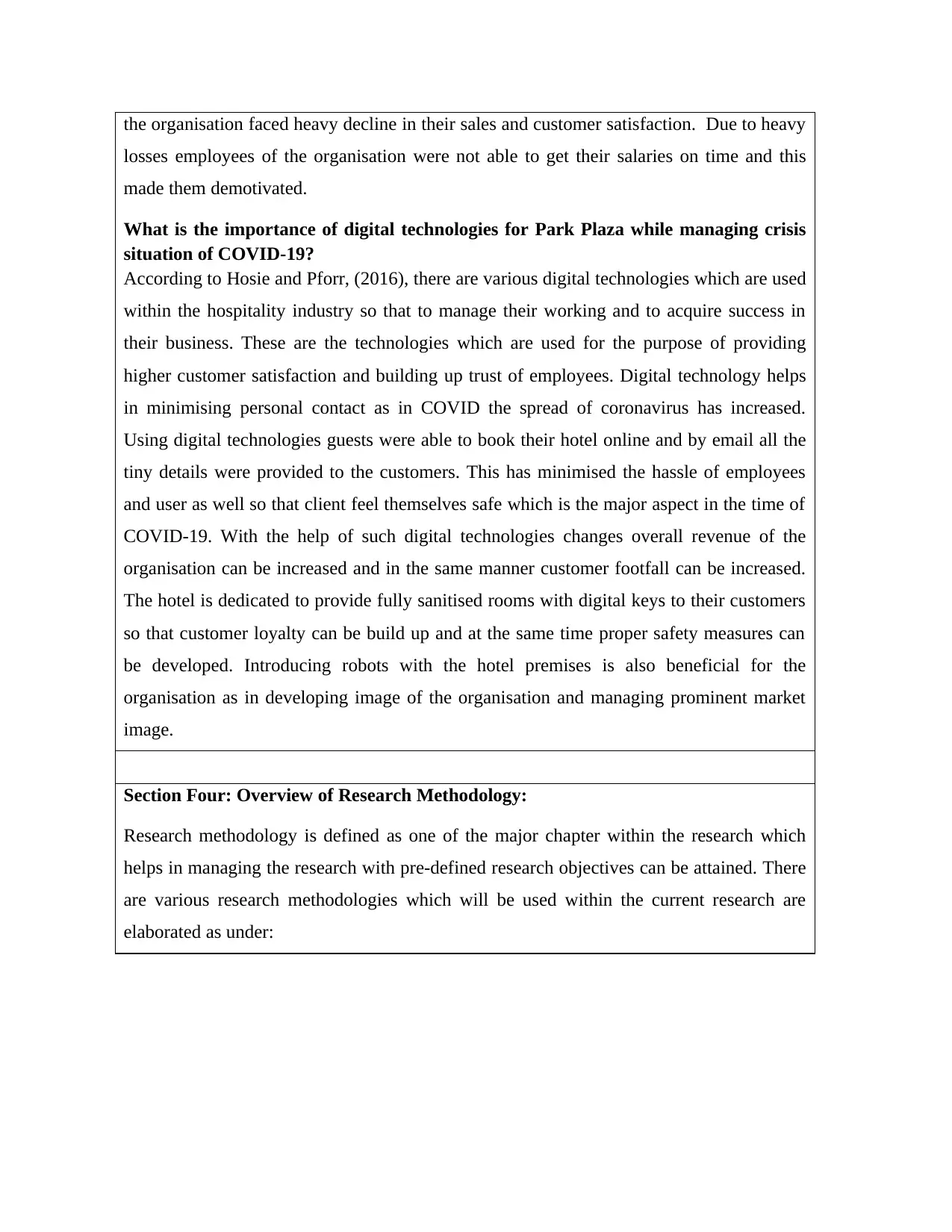
the organisation faced heavy decline in their sales and customer satisfaction. Due to heavy
losses employees of the organisation were not able to get their salaries on time and this
made them demotivated.
What is the importance of digital technologies for Park Plaza while managing crisis
situation of COVID-19?
According to Hosie and Pforr, (2016), there are various digital technologies which are used
within the hospitality industry so that to manage their working and to acquire success in
their business. These are the technologies which are used for the purpose of providing
higher customer satisfaction and building up trust of employees. Digital technology helps
in minimising personal contact as in COVID the spread of coronavirus has increased.
Using digital technologies guests were able to book their hotel online and by email all the
tiny details were provided to the customers. This has minimised the hassle of employees
and user as well so that client feel themselves safe which is the major aspect in the time of
COVID-19. With the help of such digital technologies changes overall revenue of the
organisation can be increased and in the same manner customer footfall can be increased.
The hotel is dedicated to provide fully sanitised rooms with digital keys to their customers
so that customer loyalty can be build up and at the same time proper safety measures can
be developed. Introducing robots with the hotel premises is also beneficial for the
organisation as in developing image of the organisation and managing prominent market
image.
Section Four: Overview of Research Methodology:
Research methodology is defined as one of the major chapter within the research which
helps in managing the research with pre-defined research objectives can be attained. There
are various research methodologies which will be used within the current research are
elaborated as under:
losses employees of the organisation were not able to get their salaries on time and this
made them demotivated.
What is the importance of digital technologies for Park Plaza while managing crisis
situation of COVID-19?
According to Hosie and Pforr, (2016), there are various digital technologies which are used
within the hospitality industry so that to manage their working and to acquire success in
their business. These are the technologies which are used for the purpose of providing
higher customer satisfaction and building up trust of employees. Digital technology helps
in minimising personal contact as in COVID the spread of coronavirus has increased.
Using digital technologies guests were able to book their hotel online and by email all the
tiny details were provided to the customers. This has minimised the hassle of employees
and user as well so that client feel themselves safe which is the major aspect in the time of
COVID-19. With the help of such digital technologies changes overall revenue of the
organisation can be increased and in the same manner customer footfall can be increased.
The hotel is dedicated to provide fully sanitised rooms with digital keys to their customers
so that customer loyalty can be build up and at the same time proper safety measures can
be developed. Introducing robots with the hotel premises is also beneficial for the
organisation as in developing image of the organisation and managing prominent market
image.
Section Four: Overview of Research Methodology:
Research methodology is defined as one of the major chapter within the research which
helps in managing the research with pre-defined research objectives can be attained. There
are various research methodologies which will be used within the current research are
elaborated as under:
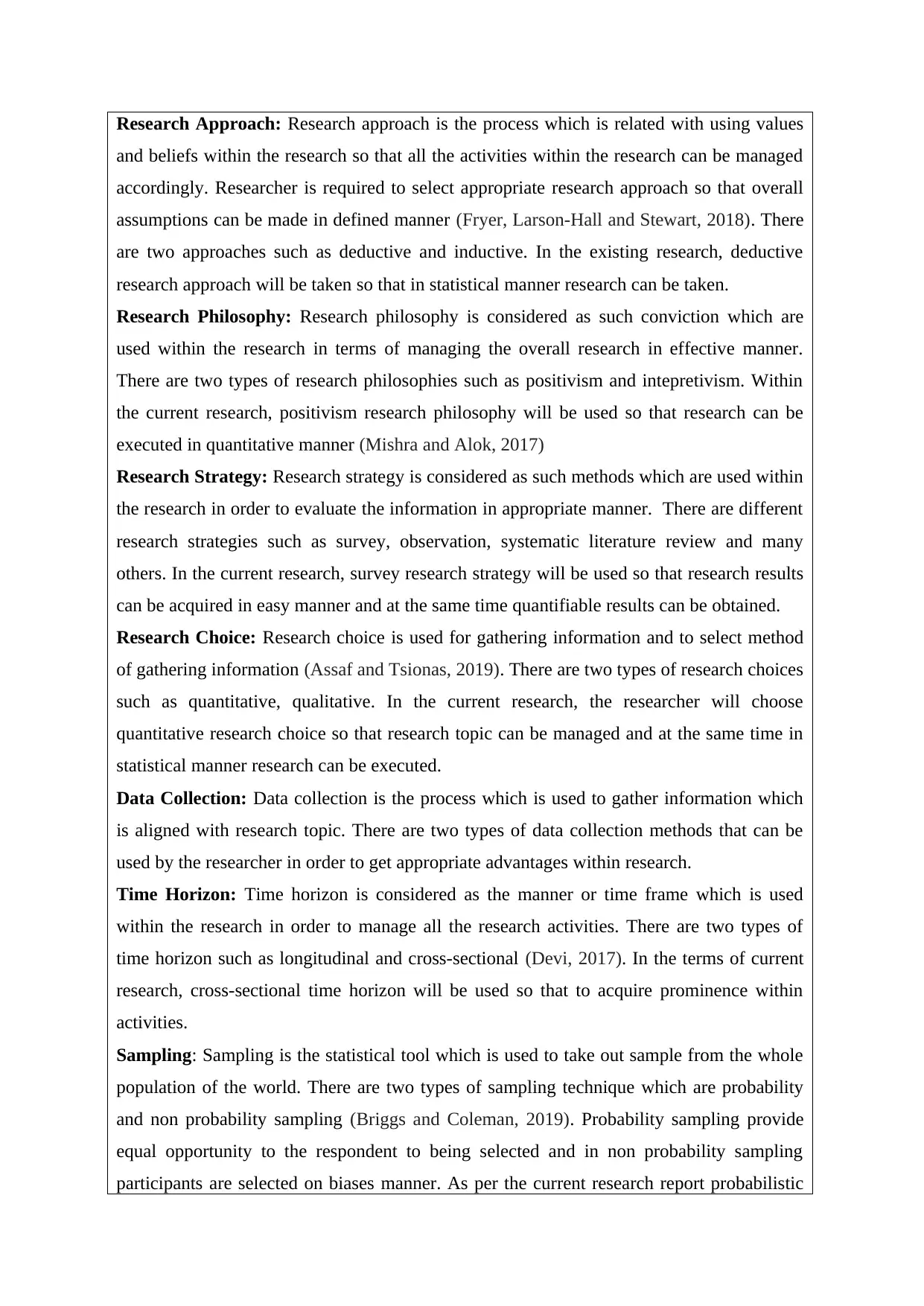
Research Approach: Research approach is the process which is related with using values
and beliefs within the research so that all the activities within the research can be managed
accordingly. Researcher is required to select appropriate research approach so that overall
assumptions can be made in defined manner (Fryer, Larson-Hall and Stewart, 2018). There
are two approaches such as deductive and inductive. In the existing research, deductive
research approach will be taken so that in statistical manner research can be taken.
Research Philosophy: Research philosophy is considered as such conviction which are
used within the research in terms of managing the overall research in effective manner.
There are two types of research philosophies such as positivism and intepretivism. Within
the current research, positivism research philosophy will be used so that research can be
executed in quantitative manner (Mishra and Alok, 2017)
Research Strategy: Research strategy is considered as such methods which are used within
the research in order to evaluate the information in appropriate manner. There are different
research strategies such as survey, observation, systematic literature review and many
others. In the current research, survey research strategy will be used so that research results
can be acquired in easy manner and at the same time quantifiable results can be obtained.
Research Choice: Research choice is used for gathering information and to select method
of gathering information (Assaf and Tsionas, 2019). There are two types of research choices
such as quantitative, qualitative. In the current research, the researcher will choose
quantitative research choice so that research topic can be managed and at the same time in
statistical manner research can be executed.
Data Collection: Data collection is the process which is used to gather information which
is aligned with research topic. There are two types of data collection methods that can be
used by the researcher in order to get appropriate advantages within research.
Time Horizon: Time horizon is considered as the manner or time frame which is used
within the research in order to manage all the research activities. There are two types of
time horizon such as longitudinal and cross-sectional (Devi, 2017). In the terms of current
research, cross-sectional time horizon will be used so that to acquire prominence within
activities.
Sampling: Sampling is the statistical tool which is used to take out sample from the whole
population of the world. There are two types of sampling technique which are probability
and non probability sampling (Briggs and Coleman, 2019). Probability sampling provide
equal opportunity to the respondent to being selected and in non probability sampling
participants are selected on biases manner. As per the current research report probabilistic
and beliefs within the research so that all the activities within the research can be managed
accordingly. Researcher is required to select appropriate research approach so that overall
assumptions can be made in defined manner (Fryer, Larson-Hall and Stewart, 2018). There
are two approaches such as deductive and inductive. In the existing research, deductive
research approach will be taken so that in statistical manner research can be taken.
Research Philosophy: Research philosophy is considered as such conviction which are
used within the research in terms of managing the overall research in effective manner.
There are two types of research philosophies such as positivism and intepretivism. Within
the current research, positivism research philosophy will be used so that research can be
executed in quantitative manner (Mishra and Alok, 2017)
Research Strategy: Research strategy is considered as such methods which are used within
the research in order to evaluate the information in appropriate manner. There are different
research strategies such as survey, observation, systematic literature review and many
others. In the current research, survey research strategy will be used so that research results
can be acquired in easy manner and at the same time quantifiable results can be obtained.
Research Choice: Research choice is used for gathering information and to select method
of gathering information (Assaf and Tsionas, 2019). There are two types of research choices
such as quantitative, qualitative. In the current research, the researcher will choose
quantitative research choice so that research topic can be managed and at the same time in
statistical manner research can be executed.
Data Collection: Data collection is the process which is used to gather information which
is aligned with research topic. There are two types of data collection methods that can be
used by the researcher in order to get appropriate advantages within research.
Time Horizon: Time horizon is considered as the manner or time frame which is used
within the research in order to manage all the research activities. There are two types of
time horizon such as longitudinal and cross-sectional (Devi, 2017). In the terms of current
research, cross-sectional time horizon will be used so that to acquire prominence within
activities.
Sampling: Sampling is the statistical tool which is used to take out sample from the whole
population of the world. There are two types of sampling technique which are probability
and non probability sampling (Briggs and Coleman, 2019). Probability sampling provide
equal opportunity to the respondent to being selected and in non probability sampling
participants are selected on biases manner. As per the current research report probabilistic
⊘ This is a preview!⊘
Do you want full access?
Subscribe today to unlock all pages.

Trusted by 1+ million students worldwide
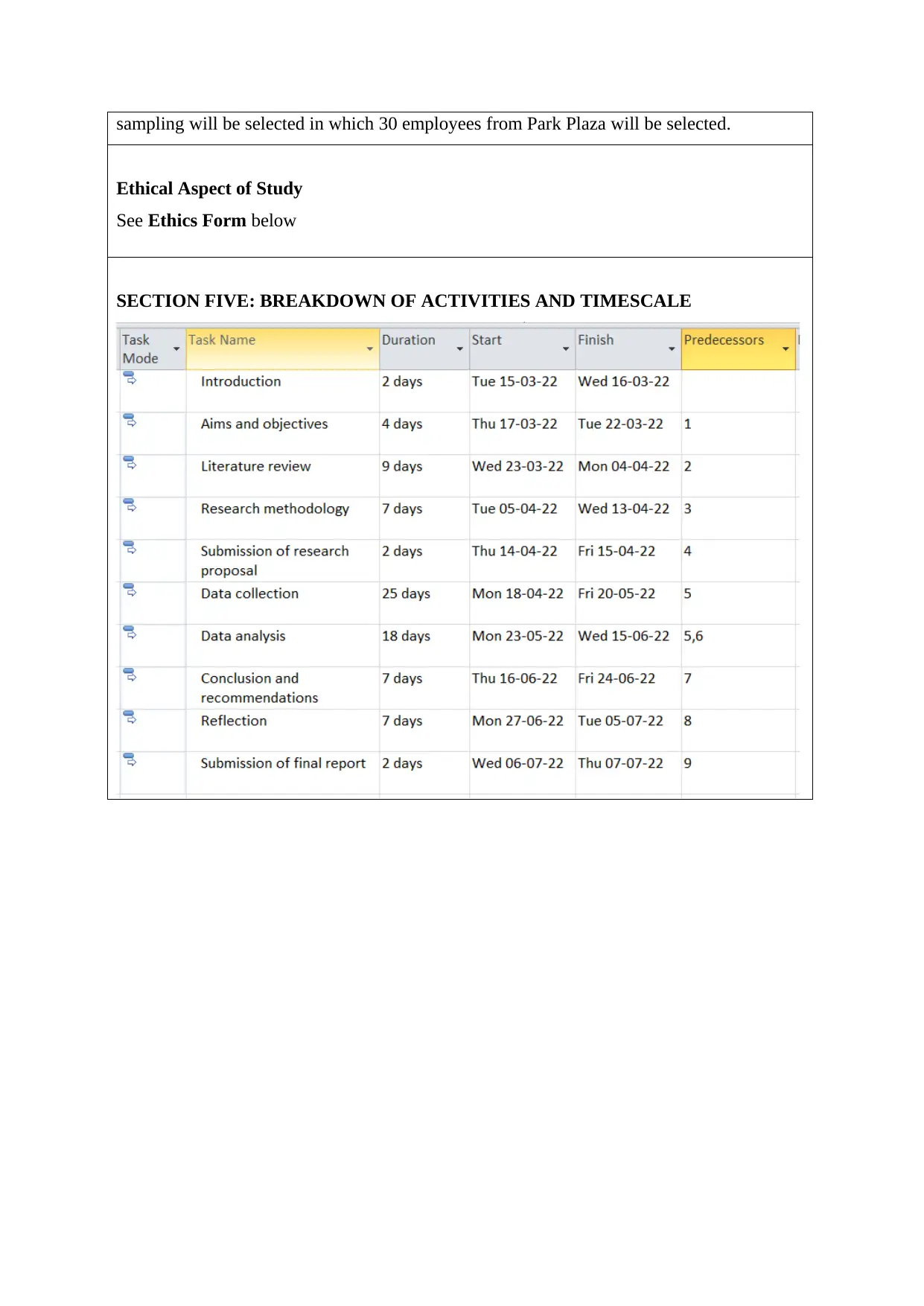
sampling will be selected in which 30 employees from Park Plaza will be selected.
Ethical Aspect of Study
See Ethics Form below
SECTION FIVE: BREAKDOWN OF ACTIVITIES AND TIMESCALE
Ethical Aspect of Study
See Ethics Form below
SECTION FIVE: BREAKDOWN OF ACTIVITIES AND TIMESCALE
Paraphrase This Document
Need a fresh take? Get an instant paraphrase of this document with our AI Paraphraser
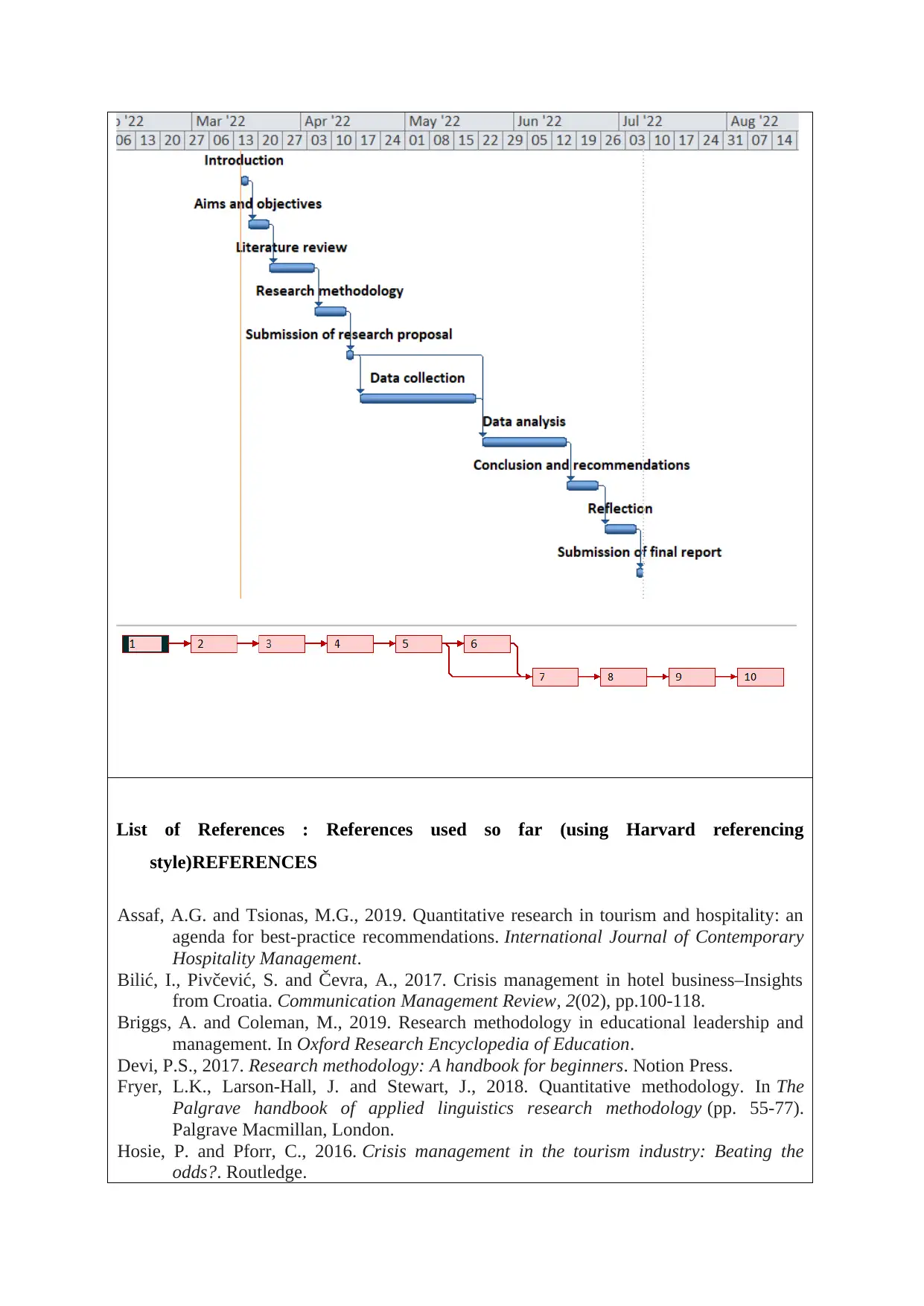
List of References : References used so far (using Harvard referencing
style)REFERENCES
Assaf, A.G. and Tsionas, M.G., 2019. Quantitative research in tourism and hospitality: an
agenda for best-practice recommendations. International Journal of Contemporary
Hospitality Management.
Bilić, I., Pivčević, S. and Čevra, A., 2017. Crisis management in hotel business–Insights
from Croatia. Communication Management Review, 2(02), pp.100-118.
Briggs, A. and Coleman, M., 2019. Research methodology in educational leadership and
management. In Oxford Research Encyclopedia of Education.
Devi, P.S., 2017. Research methodology: A handbook for beginners. Notion Press.
Fryer, L.K., Larson-Hall, J. and Stewart, J., 2018. Quantitative methodology. In The
Palgrave handbook of applied linguistics research methodology (pp. 55-77).
Palgrave Macmillan, London.
Hosie, P. and Pforr, C., 2016. Crisis management in the tourism industry: Beating the
odds?. Routledge.
style)REFERENCES
Assaf, A.G. and Tsionas, M.G., 2019. Quantitative research in tourism and hospitality: an
agenda for best-practice recommendations. International Journal of Contemporary
Hospitality Management.
Bilić, I., Pivčević, S. and Čevra, A., 2017. Crisis management in hotel business–Insights
from Croatia. Communication Management Review, 2(02), pp.100-118.
Briggs, A. and Coleman, M., 2019. Research methodology in educational leadership and
management. In Oxford Research Encyclopedia of Education.
Devi, P.S., 2017. Research methodology: A handbook for beginners. Notion Press.
Fryer, L.K., Larson-Hall, J. and Stewart, J., 2018. Quantitative methodology. In The
Palgrave handbook of applied linguistics research methodology (pp. 55-77).
Palgrave Macmillan, London.
Hosie, P. and Pforr, C., 2016. Crisis management in the tourism industry: Beating the
odds?. Routledge.
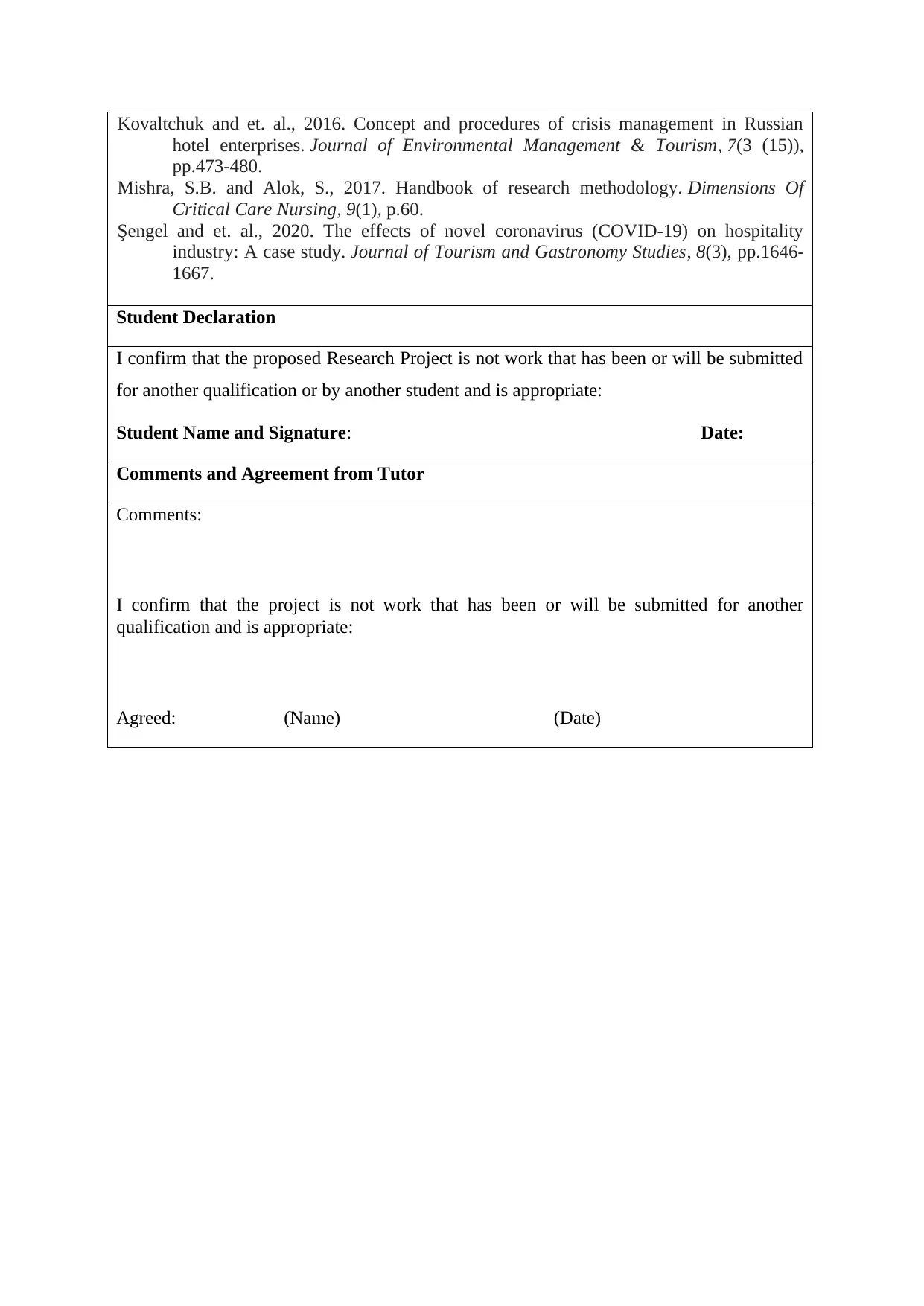
Kovaltchuk and et. al., 2016. Concept and procedures of crisis management in Russian
hotel enterprises. Journal of Environmental Management & Tourism, 7(3 (15)),
pp.473-480.
Mishra, S.B. and Alok, S., 2017. Handbook of research methodology. Dimensions Of
Critical Care Nursing, 9(1), p.60.
Şengel and et. al., 2020. The effects of novel coronavirus (COVID-19) on hospitality
industry: A case study. Journal of Tourism and Gastronomy Studies, 8(3), pp.1646-
1667.
Student Declaration
I confirm that the proposed Research Project is not work that has been or will be submitted
for another qualification or by another student and is appropriate:
Student Name and Signature: Date:
Comments and Agreement from Tutor
Comments:
I confirm that the project is not work that has been or will be submitted for another
qualification and is appropriate:
Agreed: (Name) (Date)
hotel enterprises. Journal of Environmental Management & Tourism, 7(3 (15)),
pp.473-480.
Mishra, S.B. and Alok, S., 2017. Handbook of research methodology. Dimensions Of
Critical Care Nursing, 9(1), p.60.
Şengel and et. al., 2020. The effects of novel coronavirus (COVID-19) on hospitality
industry: A case study. Journal of Tourism and Gastronomy Studies, 8(3), pp.1646-
1667.
Student Declaration
I confirm that the proposed Research Project is not work that has been or will be submitted
for another qualification or by another student and is appropriate:
Student Name and Signature: Date:
Comments and Agreement from Tutor
Comments:
I confirm that the project is not work that has been or will be submitted for another
qualification and is appropriate:
Agreed: (Name) (Date)
⊘ This is a preview!⊘
Do you want full access?
Subscribe today to unlock all pages.

Trusted by 1+ million students worldwide
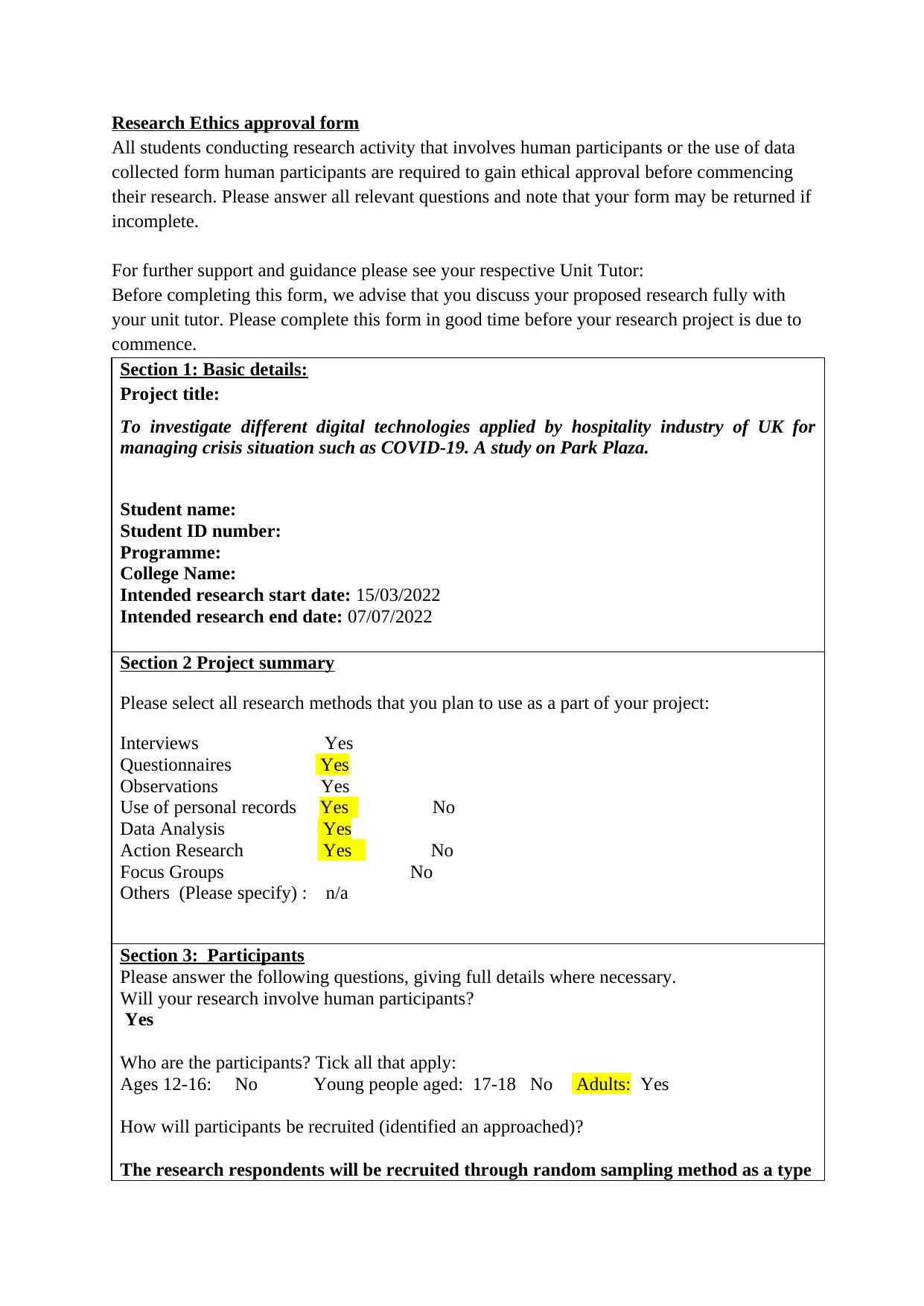
Research Ethics approval form
All students conducting research activity that involves human participants or the use of data
collected form human participants are required to gain ethical approval before commencing
their research. Please answer all relevant questions and note that your form may be returned if
incomplete.
For further support and guidance please see your respective Unit Tutor:
Before completing this form, we advise that you discuss your proposed research fully with
your unit tutor. Please complete this form in good time before your research project is due to
commence.
Section 1: Basic details:
Project title:
To investigate different digital technologies applied by hospitality industry of UK for
managing crisis situation such as COVID-19. A study on Park Plaza.
Student name:
Student ID number:
Programme:
College Name:
Intended research start date: 15/03/2022
Intended research end date: 07/07/2022
Section 2 Project summary
Please select all research methods that you plan to use as a part of your project:
Interviews Yes
Questionnaires Yes
Observations Yes
Use of personal records Yes No
Data Analysis Yes
Action Research Yes No
Focus Groups No
Others (Please specify) : n/a
Section 3: Participants
Please answer the following questions, giving full details where necessary.
Will your research involve human participants?
Yes
Who are the participants? Tick all that apply:
Ages 12-16: No Young people aged: 17-18 No Adults: Yes
How will participants be recruited (identified an approached)?
The research respondents will be recruited through random sampling method as a type
All students conducting research activity that involves human participants or the use of data
collected form human participants are required to gain ethical approval before commencing
their research. Please answer all relevant questions and note that your form may be returned if
incomplete.
For further support and guidance please see your respective Unit Tutor:
Before completing this form, we advise that you discuss your proposed research fully with
your unit tutor. Please complete this form in good time before your research project is due to
commence.
Section 1: Basic details:
Project title:
To investigate different digital technologies applied by hospitality industry of UK for
managing crisis situation such as COVID-19. A study on Park Plaza.
Student name:
Student ID number:
Programme:
College Name:
Intended research start date: 15/03/2022
Intended research end date: 07/07/2022
Section 2 Project summary
Please select all research methods that you plan to use as a part of your project:
Interviews Yes
Questionnaires Yes
Observations Yes
Use of personal records Yes No
Data Analysis Yes
Action Research Yes No
Focus Groups No
Others (Please specify) : n/a
Section 3: Participants
Please answer the following questions, giving full details where necessary.
Will your research involve human participants?
Yes
Who are the participants? Tick all that apply:
Ages 12-16: No Young people aged: 17-18 No Adults: Yes
How will participants be recruited (identified an approached)?
The research respondents will be recruited through random sampling method as a type
Paraphrase This Document
Need a fresh take? Get an instant paraphrase of this document with our AI Paraphraser
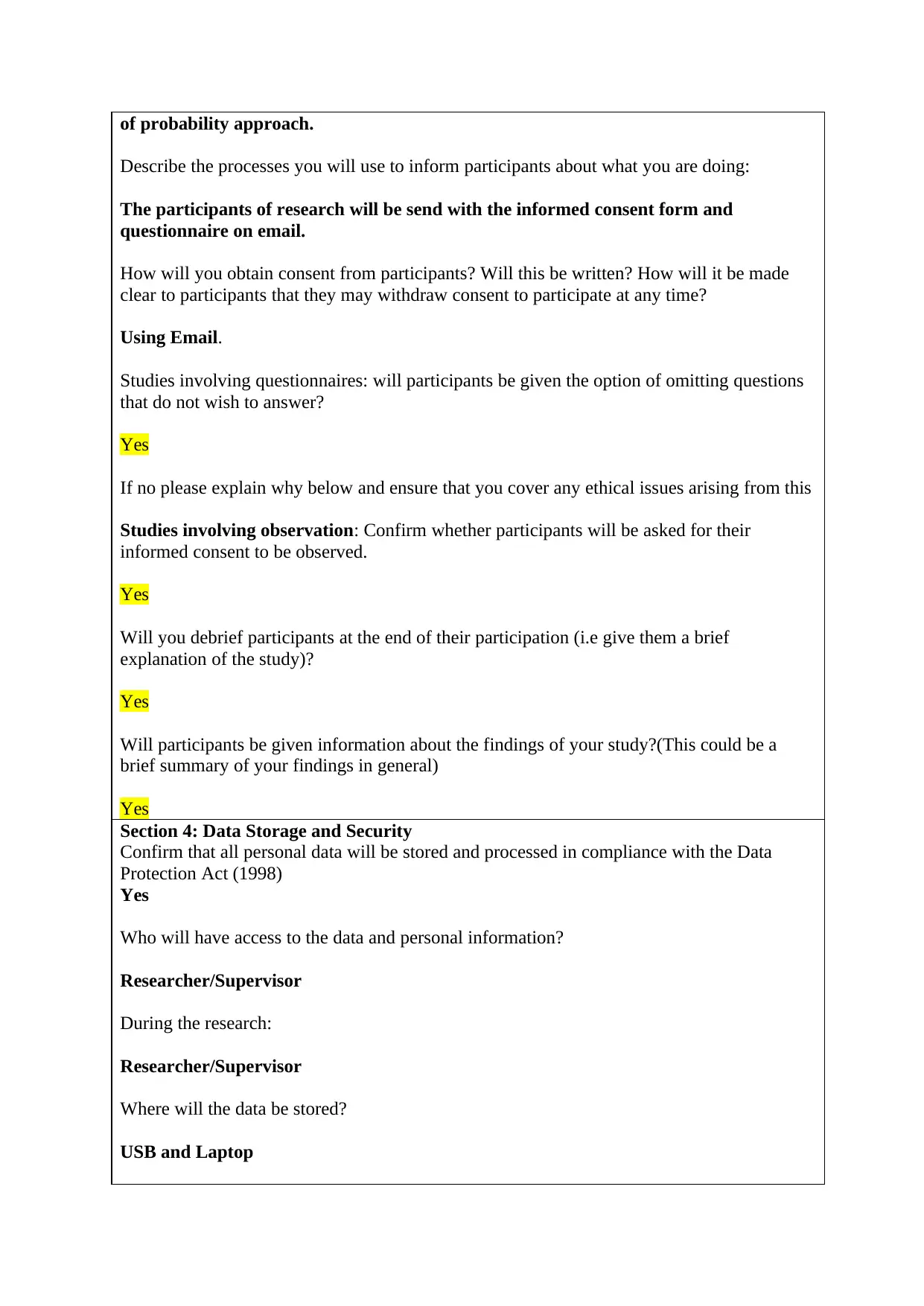
of probability approach.
Describe the processes you will use to inform participants about what you are doing:
The participants of research will be send with the informed consent form and
questionnaire on email.
How will you obtain consent from participants? Will this be written? How will it be made
clear to participants that they may withdraw consent to participate at any time?
Using Email.
Studies involving questionnaires: will participants be given the option of omitting questions
that do not wish to answer?
Yes
If no please explain why below and ensure that you cover any ethical issues arising from this
Studies involving observation: Confirm whether participants will be asked for their
informed consent to be observed.
Yes
Will you debrief participants at the end of their participation (i.e give them a brief
explanation of the study)?
Yes
Will participants be given information about the findings of your study?(This could be a
brief summary of your findings in general)
Yes
Section 4: Data Storage and Security
Confirm that all personal data will be stored and processed in compliance with the Data
Protection Act (1998)
Yes
Who will have access to the data and personal information?
Researcher/Supervisor
During the research:
Researcher/Supervisor
Where will the data be stored?
USB and Laptop
Describe the processes you will use to inform participants about what you are doing:
The participants of research will be send with the informed consent form and
questionnaire on email.
How will you obtain consent from participants? Will this be written? How will it be made
clear to participants that they may withdraw consent to participate at any time?
Using Email.
Studies involving questionnaires: will participants be given the option of omitting questions
that do not wish to answer?
Yes
If no please explain why below and ensure that you cover any ethical issues arising from this
Studies involving observation: Confirm whether participants will be asked for their
informed consent to be observed.
Yes
Will you debrief participants at the end of their participation (i.e give them a brief
explanation of the study)?
Yes
Will participants be given information about the findings of your study?(This could be a
brief summary of your findings in general)
Yes
Section 4: Data Storage and Security
Confirm that all personal data will be stored and processed in compliance with the Data
Protection Act (1998)
Yes
Who will have access to the data and personal information?
Researcher/Supervisor
During the research:
Researcher/Supervisor
Where will the data be stored?
USB and Laptop
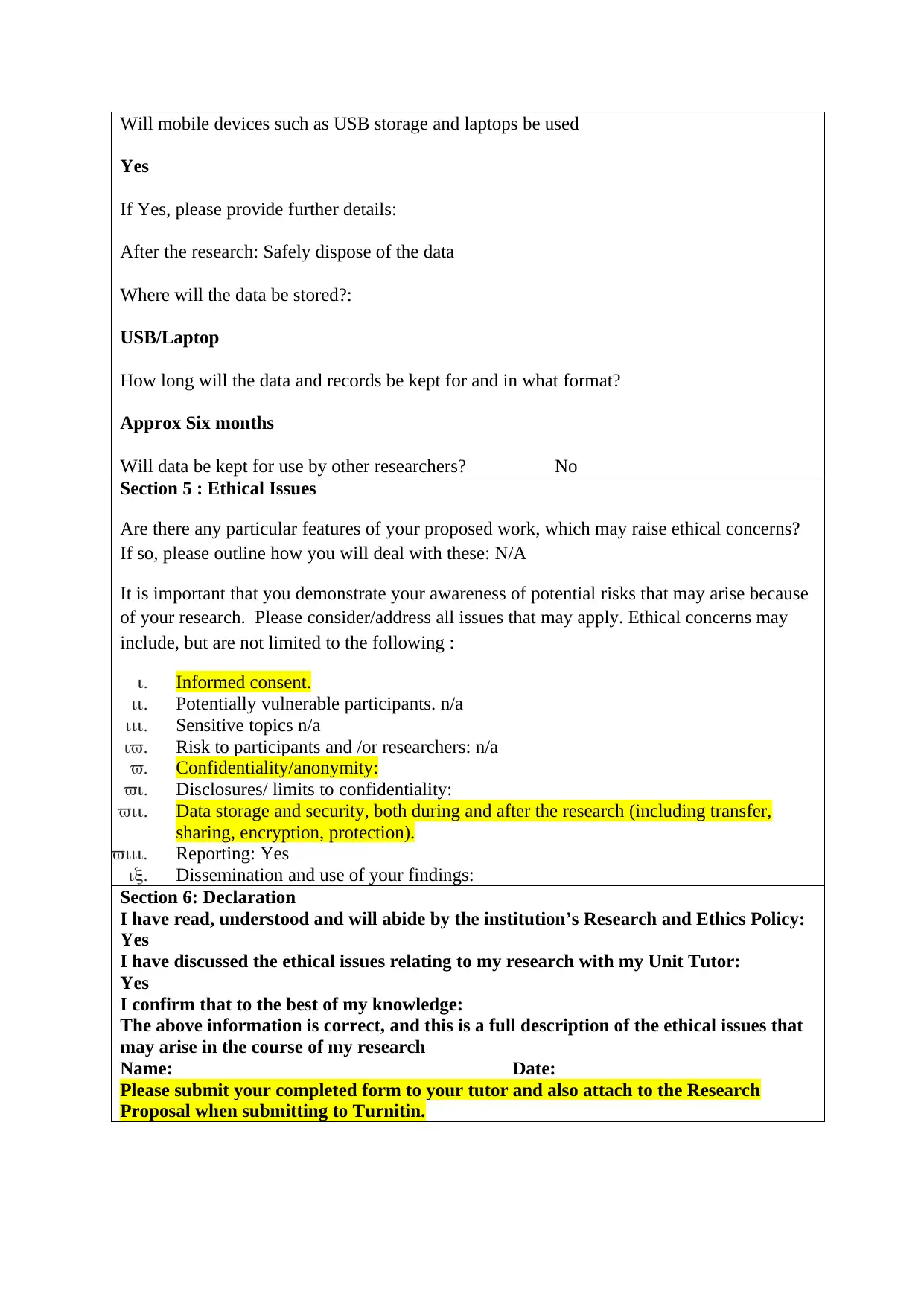
Will mobile devices such as USB storage and laptops be used
Yes
If Yes, please provide further details:
After the research: Safely dispose of the data
Where will the data be stored?:
USB/Laptop
How long will the data and records be kept for and in what format?
Approx Six months
Will data be kept for use by other researchers? No
Section 5 : Ethical Issues
Are there any particular features of your proposed work, which may raise ethical concerns?
If so, please outline how you will deal with these: N/A
It is important that you demonstrate your awareness of potential risks that may arise because
of your research. Please consider/address all issues that may apply. Ethical concerns may
include, but are not limited to the following :
i. Informed consent.
ii. Potentially vulnerable participants. n/a
iii. Sensitive topics n/a
iv. Risk to participants and /or researchers: n/a
v. Confidentiality/anonymity:
vi. Disclosures/ limits to confidentiality:
vii. Data storage and security, both during and after the research (including transfer,
sharing, encryption, protection).
viii. Reporting: Yes
ix. Dissemination and use of your findings:
Section 6: Declaration
I have read, understood and will abide by the institution’s Research and Ethics Policy:
Yes
I have discussed the ethical issues relating to my research with my Unit Tutor:
Yes
I confirm that to the best of my knowledge:
The above information is correct, and this is a full description of the ethical issues that
may arise in the course of my research
Name: Date:
Please submit your completed form to your tutor and also attach to the Research
Proposal when submitting to Turnitin.
Yes
If Yes, please provide further details:
After the research: Safely dispose of the data
Where will the data be stored?:
USB/Laptop
How long will the data and records be kept for and in what format?
Approx Six months
Will data be kept for use by other researchers? No
Section 5 : Ethical Issues
Are there any particular features of your proposed work, which may raise ethical concerns?
If so, please outline how you will deal with these: N/A
It is important that you demonstrate your awareness of potential risks that may arise because
of your research. Please consider/address all issues that may apply. Ethical concerns may
include, but are not limited to the following :
i. Informed consent.
ii. Potentially vulnerable participants. n/a
iii. Sensitive topics n/a
iv. Risk to participants and /or researchers: n/a
v. Confidentiality/anonymity:
vi. Disclosures/ limits to confidentiality:
vii. Data storage and security, both during and after the research (including transfer,
sharing, encryption, protection).
viii. Reporting: Yes
ix. Dissemination and use of your findings:
Section 6: Declaration
I have read, understood and will abide by the institution’s Research and Ethics Policy:
Yes
I have discussed the ethical issues relating to my research with my Unit Tutor:
Yes
I confirm that to the best of my knowledge:
The above information is correct, and this is a full description of the ethical issues that
may arise in the course of my research
Name: Date:
Please submit your completed form to your tutor and also attach to the Research
Proposal when submitting to Turnitin.
⊘ This is a preview!⊘
Do you want full access?
Subscribe today to unlock all pages.

Trusted by 1+ million students worldwide
1 out of 12
Related Documents
Your All-in-One AI-Powered Toolkit for Academic Success.
+13062052269
info@desklib.com
Available 24*7 on WhatsApp / Email
![[object Object]](/_next/static/media/star-bottom.7253800d.svg)
Unlock your academic potential
Copyright © 2020–2026 A2Z Services. All Rights Reserved. Developed and managed by ZUCOL.





